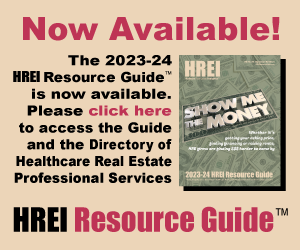HRE sector professionals not yet ready to comment on possible market pause
NATIONWIDE — Concerns over the coronavirus, or COVID-19, coupled with falling oil prices, have had an unmistakable impact on global financial markets. Last week (March 2-6), stocks suffered their worst weekly decline since the 2008 financial crisis, and the Dow Jones Industrial Average (DJIA) plunged another almost 2,000 points Monday (March 9) before rebounding by more than 1,100 points yesterday (March 10). This morning (March 11), futures losses pointed to another volatile session and another big decline in the Dow.
What might this mean for the healthcare real estate (HRE) space and the rest of the U.S. economy?
HREI reached out to a number of professionals involved in the HRE sector on Monday and, for the most part, they said it is just too difficult and early to determine whether concerns regarding the coronavirus will have an effect on the space, including medical office building (MOB) sales and perhaps development.
“I think it’s too early to tell the impacts of COVID-19,” one HRE professional told HREI. However, they added, “The virus, combined with the recent price slashing of oil by Saudi Arabia, has obviously rocked the equity markets. As such, publicly traded REITs are the most vulnerable to the volatility, along with any impact the virus could have on their senior housing holdings.
“We have spoken to several lenders in the market, and while they are still ‘business as normal’ for medical office deals, spreads are hard to pin down.”
As HRE sector professionals have long noted, MOBs, and perhaps other medical facilities, are considered to be, for the most part, recession-resistant investments. That’s because the tenants in the buildings, namely hospitals, health systems and physician practices, tend to be recession-resistant businesses themselves.
However, the effects of outside forces, including so-called “Black Swan” events, which the coronavirus at this point could be considered, can cause a slowdown even in the HRE space.
As an example, although MOBs provided solid returns for their owners during the Great Recession of 2007-09, yearly MOB sales volumes dropped significantly during that time. The low point, according to data from RCA, came in 2009, when total MOB sales nationwide were just $1.9 billion, the lowest total at that time since the firm began keeping records in 2003.
Of course, although economists generally agree that the coronavirus will cause an economic slowdown that will be longer and deeper than first thought, talk of a recession might be premature — at least in the United States.
“While the U.S. economy will be hurt by the effects of the virus, we believe that the momentum of the economy is strong enough to avoid a recession,” London-based economic research firm IHS Markit said this morning. “Europe is likely to be harder hit, with Germany and Italy in or near recession before the epidemic. This could well drag the rest of the eurozone into recession.”
HREI will continue to monitor the impact of the coronavirus outbreak on the HRE space in the weeks to come. Please visit HREInsights.com regularly for updates.
The full content of this article is only available to paid subscribers. If you are an active subscriber, please log in. To subscribe, please click here: SUBSCRIBE







